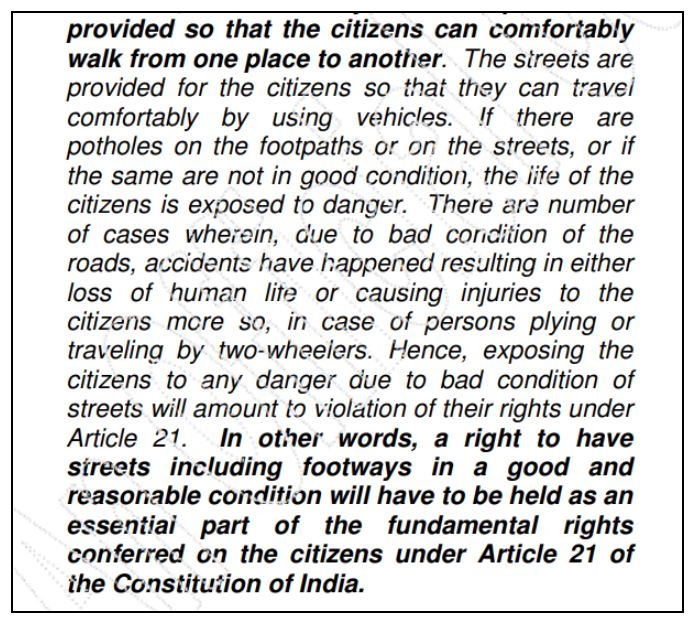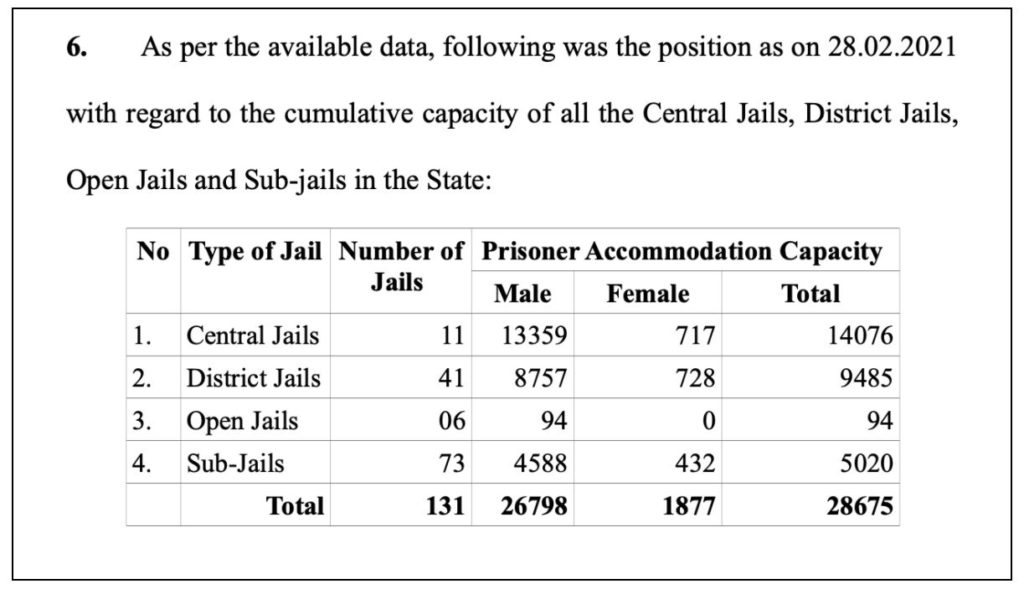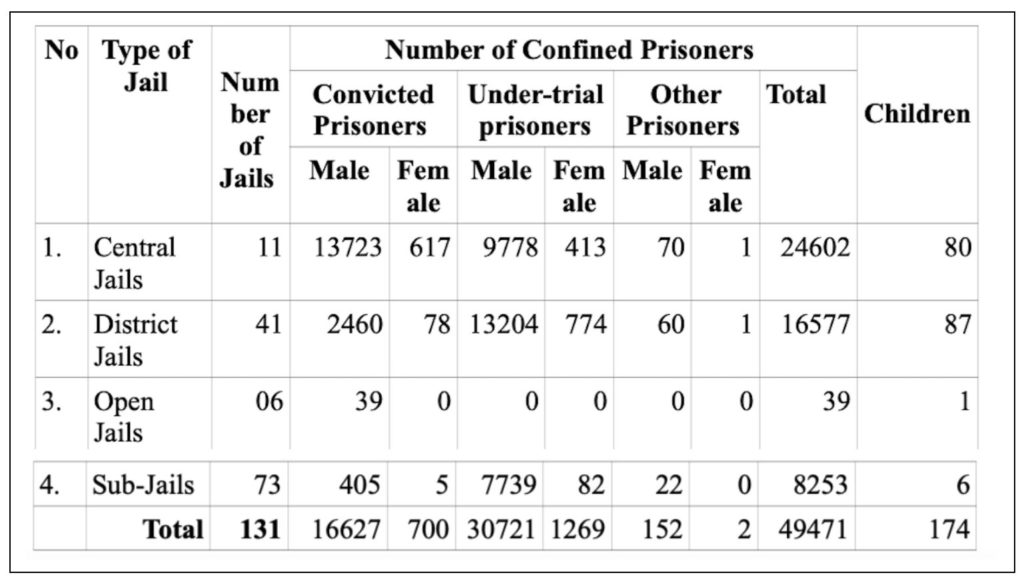In this roundup of Court judgements, we look at Constitutional Courts’ remarks & directions on the concern regarding the shortage of the COVID-19 vaccine, the need to decongest jails due to the high risk of transmission, and illegal parking on footpaths and streets.
Karnataka HC: Illegal parking on footpaths or public streets will amount to violation of fundamental rights under Article 21.
In the case Ramachandra Reddy vs. Commissioner of Police, Bangalore, the high court held that encroachment of footways or public streets upon in any manner, including by parking of vehicles, will amount to violation of fundamental rights guaranteed under Article 21
The court was hearing public interest litigation regarding the encroachments made on footpaths/ footways in a particular location of the city. The petitioner also prayed for making a particular street one-way and for ensuring that all road signals are erected.
The petitioner submitted photographs revealing that the footways are being used for parking two-wheelers and four-wheelers. The report submitted by the Member Secretary of the District Legal Services Authority also showed that the footways are being used for parking vehicles and particularly two-wheelers and there are other encroachments on the footways.
In examining the provisions of the Karnataka Municipal Corporations Act, 1976, the high court held that it is the statutory obligation of the BBMP to properly maintain public streets, and the right to have roads and footways in a reasonable condition is a part of the right guaranteed under Article 21.

Therefore, the court held that serious consequences may follow in the event there is a breach or violation of the said right guaranteed by the Constitution of India, by the BBMP, or any other Corporation established under the Act of 1976. Thus, it follows that if the footways or public streets are encroached upon in any manner including by parking of vehicles, it will amount to a violation of fundamental rights guaranteed under Article 21 of the Constitution of India.
Madhya Pradesh HC: The need of the hour is to immediately decongest jails.
In a suo moto proceeding, the high court took note of regular reports about prisoners, both under-trial and convicted, being found infected with Coronavirus. Considering that all the Jails in the State are presently housing prisoners almost double the number of their capacity, the high court observed that the need of the hour is to immediately decongest them.
The judgement mentions the World Health Organisation’s (WHO) report titled “Preparedness, Prevention and control of COVID-19 in prisons and other places of detention” that highlights that prisoners are more vulnerable to the pandemic than the general population because of the confined conditions in which they live together for prolonged periods of time. The judgement also highlights the Supreme Court case that acknowledged “a high risk of transmission of COVID-19 to prison inmates”, with prisoners, prison staff, families of prisoners and lawyers entering and leaving jails frequently, and called upon the State Governments and the Union Territories to submit replies on steps being taken by them to prevent the spread of the pandemic among prisoners and juveniles. The apex court suggested that prisoners convicted of or charged with offences involving jail terms of seven years or less could be considered for release on parole or interim bail. It was, however, left open for the ‘High Powered Committees’ to determine the category of prisoners who should be released.
The judgement notes the actual number of the prisoners against the cumulative capacity of all the Central Jails, District Jails, Open Jails, and Sub-jails in the State at the end of February 2021.


In view of the overly congested situation of jails and the unprecedented situation faced by the country following the second wave of COVID-19, the bench recommended that the jail authorities should consider granting emergent parole, of at least 90 days, on usual conditions to the following categories of prisoners:
- All male prisoners, who are more than 60 years of age. All-female prisoners, who are more than 45 years of age.
- All female prisoners, regardless of their age, who are lodged in jail along with their minor children.
- All female prisoners who are carrying pregnancy of whatever duration.
- All prisoners on the basis of a medical certification found to be suffering from cancer, serious heart ailments such as having: (i)undergone bypass surgery, (ii)valve replacement surgery, (iii)HIV, (iv)Cancer, (v)Chronic Kidney Dysfunction (UTPs requiring Dialysis), (vi)Hepatitis B or C, (vii)Asthma, (viii)Tuberculosis and (ix)disablement of body to the extent of 40% or more.
For under-trial prisoners, the bench recommended the following:
The Superintendent of Jails should in respect of under-trials prisoners, who are facing trial for the offence punishable up to a maximum of seven years, obtain their applications for interim bail and forward the same to the District and Session Judge concerned, who shall have the same considered and decided within four days for their release on temporary bail for at least a period of 90 days, on the execution of bail bond and surety.
The Superintendent of Jail should in respect of those under-trial prisoners, who are covered by the SOP issued by the National Legal Services Authority in December 2018, obtain their applications for grant of interim bail and similarly forward the same to the District and Session Judge concerned, who shall have the same considered and decided within four days for their release on temporary bail for at least a period of 90 days, on the execution of bail bond and surety. In this regard, the assistance of the District Legal Services Authority may be taken if necessary.
In addition to the above, the high court also to issue following directions:
- The State Authorities shall periodically subject all the prisoners to the RT-PCR test, once in every fortnight, so as to screen and segregate those who are found corona positive.
- All new inmates, before being lodged in any Jail, should be first subjected to an RT-PCR test and kept in a separate ward till they have tested negative.
- If any prisoner covered under any of the aforesaid categories for releasing him/her on parole or temporary bail, or otherwise, is found corona positive or suffering from any other ailment, may be provided treatment at the nearest Government Hospital.
- The State Authorities shall also get the details of all the juveniles lodged either in Children Home or those in conflict with the law, kept in Reformatory/Rehabilitation Centres and subject them to RT-PCR test once in every fortnight, so as to screen and segregate those, who are found corona positive.
- If any prisoner is found to be detained in jail for the reason of his/her inability to pay the fine imposed, the State Government shall take steps to waive off such fine and ensure their release at the earliest.
- The Jail Authorities shall place the data of such under-trial prisoners who are facing trial for offences exclusively triable by the Court of Magistrate before the High-Powered Committee for their consideration.
- The respondent state authorities should divide all the inmates in the jails on the basis of the age group of 18-45 years and those above 45 years for their vaccination on priority and shall place on record the action plan for their vaccination.
High courts express concern over shortage of COVID-19 vaccine
While recognizing that vaccination is a major step required to prevent the spread of COVID-19, several high courts of the country expressed concern over the shortage of vaccines being faced by states. Given the present circumstances, the courts noted that the facts and figures on record show that the situation on availability of vaccines is not reassuring, with several states facing difficulties in maintaining the pace of their vaccination drives.
Karnataka HC: Not giving second dose of COVID-19 vaccine will be a violation of fundamental right to life under Article 21.
The Karnataka High Court has directed the state government to place on record a road map on how it proposes to provide vaccination to everyone in the state. The court has also asked the state to elucidate how it is going to achieve the target of vaccinating those above the age of 45 years and how it proposes to cover the weaker sections of the society.
The high court also observed that not giving a second dose of the COVID-19 vaccine will be a violation of the fundamental right to life under Article 21 of the Constitution. On perusing the figures, the court noted that broadly there are 31 lakh beneficiaries in the state, who are awaiting their second dose per prevailing policy. However, the total stock of vaccines in the state as of 13 May 2021, is 12,32,960 doses (inclusive of both Government of India quota and state procured). On state’s submission, the bench noted that currently there are 14,87,262 Covishield beneficiaries due for the 2nd dose and 5,10,467 Covaxin beneficiaries due for the 2nd dose, out of the stock of 12,32,960 available. Thus, the court notes that there will be a gap of approx. 8.73 lakh vaccine doses.
The court observed that if the present scenario continues, the vaccination drive will be completely ineffective in the state. The high court urged the Central Government to bridge the gap in the shortage of vaccine at the earliest to prevent wastage of National Resources.
Kerala HC: Directed the central government to furnish a time-frame within which vaccines will be supplied to state
While taking up a PIL challenging the Centre’s ‘Liberalised Pricing and Accelerated National Covid-19 Vaccination Strategy’, the high court directed the Centre to apprise it of the time frame within which Covid vaccines could be supplied to the State. In another order dated 07 May 2021, the high court had asked the Centre to furnish details regarding the supply of vaccines to Kerala.
Delhi HC: Dissemination of information on COVID-19 management crucial
On hearing a clutch of petitions concerning the COVID-19 situation in the national capital, the bench comprising of Justice Vipin Sanghi and Justice Rekha Palli urged the Central government and Government of Delhi to take steps regarding the dissemination of information on COVID-19 management. The high court held that appropriate dissemination of information is the responsibility of the state. Questioning the caller tune used for awareness of vaccination drive, the high court also questioned the centre on how will people get vaccinated if there are not enough vaccines.
In submission, the counsel for GoI apprised the high court that the Indian Council of Medical Research (ICMR) has from time to time updated the guidelines and have also taken steps to share regular tweets and short videos on ICMR’s Twitter handle and that the brochures are uploaded on the website.
To this, the bench observed that informative audio-visuals should be televised on news channels like Doordarshan. The court emphasised that information on what kind of Concentrator to buy, what are the do’s and don’ts, etc. are crucial under the current circumstances and must be provided to people in an easily understandable manner. The high court also suggested that engagement with a team of producers or experts in collaboration with the experts themselves can be used for the dissemination and propagation of COVID-19 information.
Featured Image: Important Court Decisions


